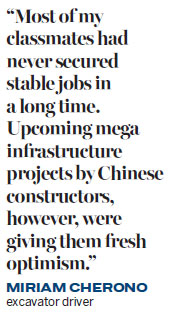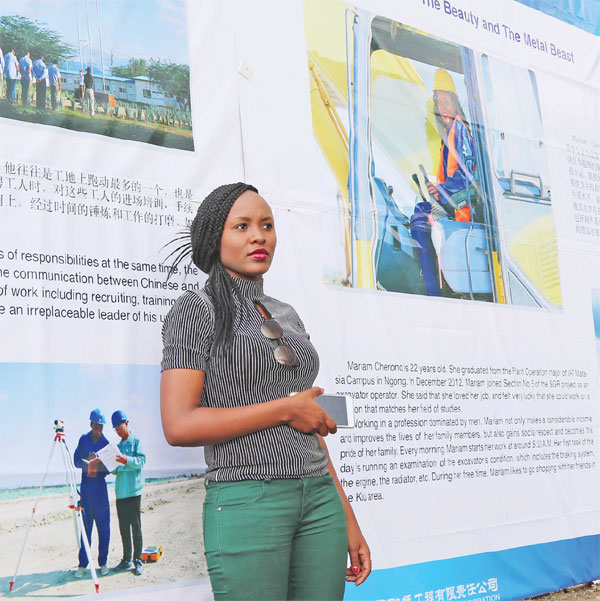Petite woman masters a big job

Young Kenyan, proving her mastery of heavy equipment, helps Chinese company build key national railway project
Miriam Cherono has jumped into the limelight for all the right reasons. She is not only holding her own but excelling in a male-dominated world where heavy, clanking construction equipment moves tons of earth and stone to build a highway of steel across Kenya's heartland.
Cherono, 23, is the only woman operating a 20-metric-ton excavator at section five in Kiuu, one of the construction sites for the $3.3 billion Mombasa-Nairobi Standard Gauge Railway that is being built by China Road and Bridge Co.
| Miriam Cherono is the only woman operating a 20-metric-ton excavator at section five in Kiuu, one of the construction sites for the $3.3 billion Mombasa-Nairobi Standard Gauge Railway. Liu Hongjie / China Daily |
There are 13 female employees operating the machines on the whole project, officials confirm.
Cherono has been featured in Kenyan media using the popular "strength of a woman" theme, popularized by the movie of the same name.
The petite, 5-foot-4-inch woman has been shown effortlessly operating her machine as it expertly scoops a bucketful of stones and loads them into waiting trucks driven by her male colleagues. Above her shoulders, the spanking-new railway cuts across the frame, a testament to the close cooperation between Chinese and Kenyan workers in putting up the nation's first new railroad in more than a century.
It's clear that the fresh-faced operator has been somewhat taken aback by all the attention she is receiving for doing her job. After all, she is an average Kenyan who took a one-month certificate course in plant operation at the little-known Matasia Applied Training Institute, about an hour's drive from downtown Nairobi.
She is, however, aware that this may not have happened were it not for her ambitious 64-year-old grandmother and the willingness of CRBC to give her the rare opportunity.
Cherono hails from one of the small sub-tribes in the greater Kalenjin community that occupies the Great Rift Valley. Culturally, women are not highly esteemed, she says, but she rose above the usual social expectations by performing chores set aside for boys, such as herding.

"My grandmother needn't bother looking for a boy when I was around during the school holidays," she says. "This led to her belief that I was capable of handling male-dominated fields."
Her grandmother, now a retired community nurse, stepped up her suggestions immediately after her granddaughter completed her four years in secondary school. After talking to a village boy who had just completed a mechanical course at the technical institute, Cherono headed off to the big city and was admitted to the technical college after parting with $706. "My parents, who work in Kericho Tea Factory, had no choice in the matter," she says.
Contrary to the expectations of some, she found her classes exciting. Cherono was the only woman in a class of 54. Most of her fellow students already had experience in the technical field, with some of them supporting their children in universities. They had come to hone their skills to improve their job prospects in the cutthroat field, Cherono says.
"Most of my classmates had never secured stable jobs in a long time. Upcoming mega infrastructure projects by Chinese constructors, however, were giving them fresh optimism."
For one month, she learned to operate the mechanical shovels, excavators, graders, backhoes and rollers. Cherono was not intimidated. "Operating the machine is much simpler that driving a car," she says.
She became aware that her tenacity determined her job prospects. So she worked harder in school, she says, and earned distinction beyond simply getting her certificate and license to operate the humongous machines.
An uncle facilitated her first internship at a construction company operated by Indians in the lakeside city of Kisumu. She was put on probation but after a month, was confirmed owing to her dexterity in operating a loader.
She was paired to work with a male colleague to load a crusher, a machine that cuts stones into various sizes from three quarters to dust depending on usage. "The crusher does not stop, so we had to match its speed. I was good and my employers were impressed with me."
After four months, Cherono moved to another company, Kisumu Concrete Ltd, where she would load stones into trucks. A year later, a former colleague called to tell her about opportunities with CRBC in Nairobi. "This is what I had been waiting for," she says, adding that immediately after she arrived at the construction site, she was given an excavator to operate. She was hired on the spot.
The Chinese managers gave more weight to her abilities than to her certificates, which makes it clear the education system needs to align programs with market needs. "My previous employers would be critical of my academic qualifications since they doubted my aptitude as a woman." She says the Chinese attitude "should be borrowed by other stakeholders across the industry".
Cherono familiarized herself with the machines, whose specifications differ depending on the manufacturer. Some use buttons while others use hand levels and clutches similar to those found in cars.
She soon realized she was the only female operator on site. But this was not to deter her and she religiously kept to the grueling work schedule of 7 am to 7 pm. She has two days off a month, which is different from previous employers, who gave her two days weekly.
Cherono was, however, determined to rise above the stereotypes that women were unable to do such work. Her tenacity has seen other workers step up their productivity as they compete. "I think my presence here encourages everyone to put their best foot forward," she says.
Wang Zonghui, one of Cherono's supervisors, says that she is driven, and this has made her stand out among her peers. "She is an excellent worker - we like her very much. It's wonderful that we can provide a platform for her dreams."
Wang says she always challenges herself to outdo her male colleagues.
Cherono is a living example of points made in a United Nations Development Program report on Accelerating Gender Equality and Women's Empowerment in Africa. The report says the continent risks failing to meet its sustainable development goals and Africa's Agenda 2063 if women are denied equal opportunities to contribute to economic growth.
The 2016 human development report, scheduled to be launched in Nairobi on Aug 28, finds that sub-Saharan Africa loses up to $95 billion annually because of the gender gap in labor participation alone, and that women achieve only 87 percent of the human development outcomes of men.
"Africa cannot afford to ignore 50 percent of its creative genius, 50 percent of its innovation and half of its economic drivers," says Izeduwa Derex-Briggs, the new regional director for eastern and southern Africa of United Nations Women, an agency that advocates for gender equality and women's empowerment.
She says the upsurge in mega construction projects in Africa present prime opportunities for communities to push their daughters to participate in nation-building activities.
"Social attitudes to women are responsible for gender inequality in both the education system and the labor force. Denying women access to education leads to poor appetite by women in formal jobs and subsequent concentration in low production jobs with limited career prospects.
"We need to defeat the poverty cycle by increasing chances for our women to access technical and engineering opportunities," Derex-Briggs says. She adds that this will directly unlock benefits in family health and nutrition, agriculture productivity and overall economic growth.
For Cherono, her grandmother continues to be her role model. "China presents opportunities to converge her expectations and my ambitions. I believe their advanced technology will usher a new beginning for me and other women in Africa."
lucymorangi@chinadaily.com.cn
(China Daily Africa Weekly 08/26/2016 page21)
Today's Top News
- Foreign ministers of China, Egypt call for Gaza progress
- Shield machine achieves Yangtze tunnel milestone
- Expanding domestic demand a strategic move to sustain high-quality development
- Xi hears report from Macao SAR chief executive
- Xi hears report from HKSAR chief executive
- UN envoy calls on Japan to retract Taiwan comments































